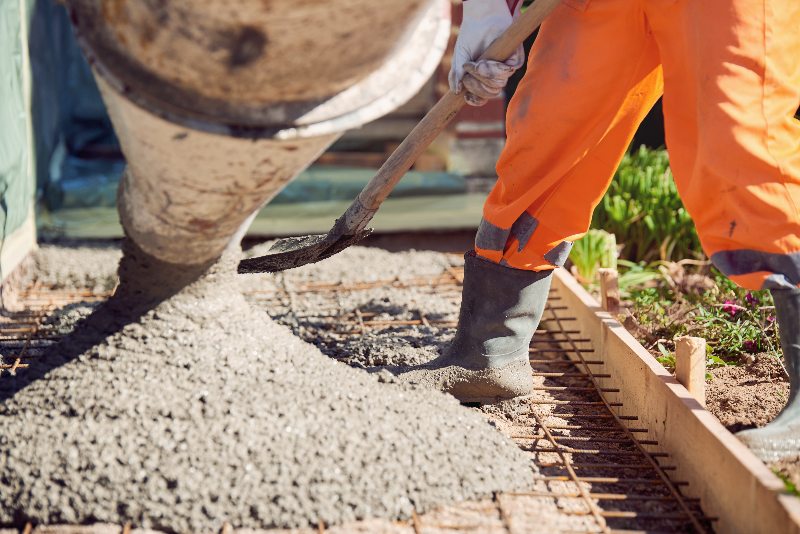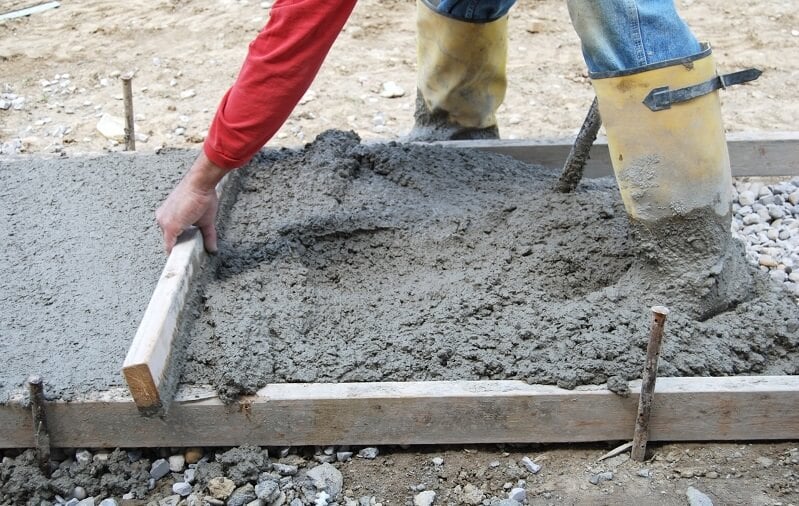
Recognizing the Important Function of a Concrete Professional in Modern Building And Construction and Style
Concrete specialists are vital to the building and layout industries. Their competence warranties that structures are not just durable yet likewise cosmetically pleasing. They engage in numerous responsibilities, from task planning to quality assurance, and collaborate with designers and designers. With progressing innovations and trends, their duty is more crucial than ever. Comprehending their influence can reveal understandings into modern building and construction techniques and the future of building layout.
The Value of Concrete in Building
Although various products are used in construction, concrete remains a cornerstone of modern structure practices as a result of its stamina, sturdiness, and flexibility. This composite product, made from cement, water, and accumulations, can withstand significant anxiety and is resistant to fire, weather condition, and bugs, making it excellent for varied applications. Concrete's versatility allows it to be molded right into various sizes and shapes, assisting in ingenious architectural styles.
Additionally, its thermal mass homes add to energy performance, assisting to manage indoor temperature levels. The widespread availability of raw products and the relatively affordable of concrete likewise boost its appeal for large-scale projects, from commercial structures to infrastructure like roads and bridges. As urbanization remains to rise, the demand for reputable and lasting structure products solidifies concrete's crucial role in building, making it an essential choice for designers and contractors intending for longevity and resilience in their tasks.
Secret Obligations of a Concrete Contractor
Concrete service providers play an essential function in the construction process, with a number of essential duties that guarantee job success. Their tasks include task planning and design, material option and monitoring, along with maintaining quality assurance and guarantee throughout the project lifecycle. Understanding these responsibilities is essential for valuing the contractor's effect on building and construction end results.
Project Preparation and Style
When starting on a construction project, reliable job planning and style play a crucial role in a concrete specialist's duties. The professional needs to work together carefully with architects, clients, and designers to comprehend the job's goals and specs. This entails assessing website problems, examining layout requirements, and identifying the scope of work. A concrete specialist is also in charge of developing timelines and spending plans, guaranteeing that all phases of the job align with overall goals. In addition, they should anticipate possible obstacles and devise solutions to maintain job effectiveness. By carefully planning and making each aspect of the concrete job, the professional sets the foundation for effective implementation, guaranteeing architectural honesty and adherence to security requirements throughout the building process.
Product Choice and Management
Effective material option and management are important responsibilities for a concrete specialist, as these decisions directly impact the top quality and sturdiness of the last structure. Concrete contractors should assess various products, consisting of aggregates, admixtures, and support kinds, to guarantee they fulfill task specs and ecological problems. They must think about elements such as strength, workability, and resistance to weathering. Furthermore, managing the supply chain is important, as timely shipment of products can remarkably affect project timelines. Contractors should maintain partnerships with providers to secure high-grade sources while likewise checking stock degrees to prevent excesses or shortages. Eventually, this careful selection and monitoring of products add to the general success of building and construction projects and the longevity of the frameworks constructed.
Quality Assurance and Assurance
Quality control and guarantee are critical in the building market, particularly for concrete service providers charged with providing durable and dependable frameworks. Concrete service providers need to implement rigorous high quality control measures throughout the building and construction process, ensuring that all products fulfill specified policies and requirements (Concrete Contractor in Dallas). This consists of keeping track of the mixing, pouring, and curing processes to avoid defects and improve structural stability. Regular assessments are crucial, enabling professionals to determine and fix issues quickly. In addition, concrete professionals commonly collaborate with engineers and architects to assure that the end product straightens with style requirements. By adhering to rigorous quality control methods, concrete service providers not only safeguard the long life of their work yet also support the trust of clients and stakeholders in the building market
Kinds Of Projects Managed by Concrete Service Providers
Although concrete service providers are usually related to large-scale building tasks, their experience encompasses a diverse series of applications. These experts are integral to domestic tasks, such as driveways, outdoor patios, and foundations, assuring longevity and visual allure. In industrial building and construction, they add to the creation of floorings, walkways, and structural elements that fulfill particular style and security criteria.
Concrete professionals are entailed in infrastructure jobs, including bridges, roads, and passages, where their skills assure architectural stability and longevity. They additionally play a critical function in decorative concrete applications, such as stamped concrete and refined surface areas, which improve the appearance of various rooms. Additionally, their services include fix and maintenance work, dealing with problems like cracking or disintegration in existing structures. This versatility emphasizes the vital duty concrete contractors play in both functional and decorative facets of modern-day building and style.
Credentials and abilities Called for
Concrete contractors should have a diverse set of certifications and skills to properly take care of the array of tasks they undertake. Efficiency in concrete mixing, pouring, and ending up is crucial, as is a strong understanding of numerous types of concrete, consisting of strengthened and attractive alternatives. Knowledge of building techniques, plans, and task monitoring principles is essential for successful execution.
Physical stamina and strength are vital due to the requiring nature of the job. Professionals must likewise have strong analytical abilities to address unexpected obstacles throughout tasks. Interaction skills are important for collaborating with clients, Recommended Reading engineers, and various other tradespeople.
Furthermore, obtaining appropriate qualifications can boost a contractor's reliability and expand their career possibilities. Continual education in brand-new techniques and products maintains contractors affordable in a rapidly evolving market. These abilities and qualifications collectively allow concrete service providers to supply high-grade outcomes effectively and efficiently.
The Function of Concrete Professionals in Safety And Security Compliance
Making sure safety and security conformity is an essential duty of concrete specialists, as they browse the intricacies of construction sites. These professionals are charged with sticking to rigid safety regulations and standards, which are essential for preventing crashes and guaranteeing the wellness of all website workers. Concrete Contractor in Dallas. Concrete specialists need to execute extensive safety strategies that include training workers on appropriate equipment use and safety methods
In addition, they are responsible for inspecting materials and work procedures to identify potential dangers. By carrying out normal safety and security audits and threat assessments, concrete specialists can proactively deal with problems before they escalate. In addition, they work together with various other building professionals, such as designers and project managers, to integrate precaution into the general project strategy. Eventually, the commitment of concrete service providers to safety conformity not only secures employees yet additionally boosts task efficiency and high quality, reinforcing their essential role in contemporary building.
Trends and Advancements in Concrete Style
Current developments in concrete layout have actually introduced a variety of trends and advancements that focus on sustainability and aesthetics. Lasting concrete solutions, ornamental ending up strategies, and smart concrete modern technologies are improving the sector. These growths not just boost architectural honesty yet additionally add to ecologically accountable building and construction practices.
Lasting Concrete Solutions
As the construction industry significantly prioritizes sustainability, innovative concrete options are arising to decrease ecological impact while boosting efficiency. One prominent fad is making use of recycled materials, such as crushed concrete and industrial results, which not just reduces waste yet likewise enhances the concrete's buildings. Furthermore, innovations in admixtures, consisting of fly ash and slag, contribute to minimized carbon emissions during manufacturing. Another substantial development entails the advancement of permeable concrete, which allows water to flow through and lowers drainage, alleviating flooding and groundwater depletion. In addition, the surge of carbon capture modern technologies in concrete production holds promise for further exhausts reduction. These sustainable concrete solutions exhibit the sector's dedication to eco responsible construction methods.

Decorative Ending Up Methods
A variety of decorative finishing strategies have emerged in concrete style, changing plain surface areas into visually striking elements. Methods such as marking, staining, and brightening permit a large range of aesthetic opportunities, catering to diverse style choices. Stamped concrete mimics natural materials like rock and brick, while tarnishing presents lively shades that boost the surface's appeal. Sleek concrete, known for its streamlined surface, includes elegance to both household and business spaces. In addition, microtopping and overlay systems supply ingenious alternatives for revitalizing existing concrete. These methods not only improve the visual features but also enhance sturdiness and upkeep. As fads progress, the assimilation of ornamental finishes remains to play a critical function in contemporary building, marrying performance with imaginative expression.

Smart Concrete Technologies
While typical concrete remains a staple in construction, the appearance of wise concrete modern technologies is changing the market by incorporating innovative features that enhance performance and sustainability. These advancements consist of self-healing concrete, which utilizes ingrained bacteria that turn on upon splitting, and sensor-equipped concrete that keeps track of structural health in real-time. In addition, go right here piezoelectric and thermochromic concrete can adjust to environmental adjustments and generate electrical energy, specifically. The application of recycled materials and eco-friendly ingredients also adds to lowering the carbon footprint of concrete production. As these technologies proceed to advance, they assure to boost durability, reduced upkeep costs, and promote greener building techniques, making them vital for future building and construction projects. The function of concrete professionals is significantly significant in using these developments.
Often Asked Questions
What Elements Impact Concrete Pricing in Building Jobs?
Concrete pricing in building projects is influenced by material prices, labor costs, job dimension, place, schedule of resources, and market need. Seasonal factors and transportation prices can also considerably influence the overall prices structure.
Just How Do Climate Condition Influence Concrete Work?
Weather condition problems substantially affect concrete work; extreme temperature levels, humidity, and precipitation can influence setting times, curing procedures, and total high quality - TJ Concrete Contractor. Service providers must adapt their techniques and timetables to alleviate these environmental impacts for successful project completion
What Is the Regular Timeline for a Concrete Project?
A regular concrete project timeline varies from a few days to numerous weeks. Factors influencing this duration consist of job dimension, intricacy, weather, and treating times, which collectively figure out the general conclusion routine.
Can Concrete Professionals Assist With Layout Assessments?
Concrete contractors can undoubtedly help with layout consultations, supplying important understandings on material selection, architectural stability, and aesthetic alternatives, making certain that projects satisfy both useful requirements and the customer's vision for the completed item.
What Prevail Mistaken Beliefs Concerning Concrete Longevity?
Common misunderstandings about concrete toughness consist of the idea that it is unsusceptible damage which all kinds are just as strong. In truth, variables like mix design, ecological problems, and upkeep greatly affect concrete's long-lasting efficiency.
They additionally play a crucial function in attractive concrete applications, such as stamped concrete and polished surfaces, which enhance the visual facet of various spaces. Effectiveness in concrete blending, putting, and ending up is crucial, as is a strong understanding of different types of concrete, consisting of enhanced and decorative choices. One noticeable fad is the usage of recycled materials, such as smashed concrete and commercial byproducts, which not only lowers waste yet also enhances the concrete's residential properties. While typical concrete stays a check it out staple in construction, the appearance of smart concrete technologies is transforming the industry by integrating innovative functions that improve efficiency and sustainability. These innovations consist of self-healing concrete, which uses ingrained germs that turn on upon fracturing, and sensor-equipped concrete that keeps an eye on structural health in real-time.